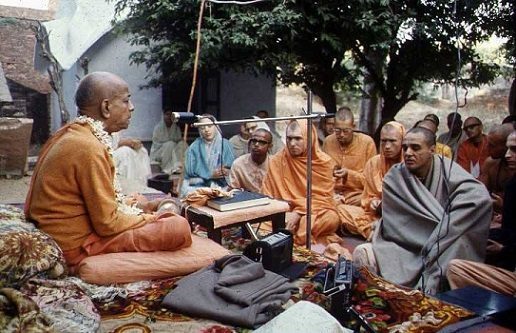Q. I’d like to know something about Vedic knowledge: specifically about categories of Sabda, Pratyaksha and Anumana. Can you tell me what do they mean?
Answer by Romapada Swami: Srila Prabhupada explains these three methods of acquiring knowledge in his Sri Isopanishad, Introduction:
“There are three kinds of evidence: pratyaksha, anumana and shabda. Pratyaksha means “direct evidence.” Direct evidence is not very good because our senses are not perfect. We are seeing the sun daily, and it appears to us just like a small disc, but it is actually far, far larger than many planets. Of what value is this seeing? Therefore we have to read books; then we can understand about the sun. So direct experience is not perfect. Then there is anumana, inductive knowledge: “It may be like this” – hypothesis. For instance, Darwin’s theory says it may be like this, it may be like that. But that is not science. That is a suggestion, and it is also not perfect. But if you receive the knowledge from the authoritative sources, that is perfect. If you receive a program guide from the radio station authorities, you accept it. You don’t deny it; you don’t have to make an experiment, because it is received from the authoritative sources.
Vedic knowledge is called shabda-pramana. Another name is shruti. Shruti means that this knowledge has to be received simply by aural reception. The Vedas instruct that in order to understand transcendental knowledge, we have to hear from the authority. Transcendental knowledge is knowledge from beyond this universe. Within this universe is material knowledge, and beyond this universe is transcendental knowledge. We cannot even go to the end of the universe, so how can we go to the spiritual world? Thus to acquire full knowledge is impossible (without hearing from authority).
The Vedic knowledge comes down by disciplic succession. It is also confirmed in the Bhagavad-Gita that Vedic knowledge is understood in this way. If you make experimental endeavor, you come to the same conclusion, but just to save time you should accept. If you want to know who your father is and if you accept your mother as the authority, then whatever she says can be accepted without argument.”
(We have also discussed these terms briefly in Digest 149)







